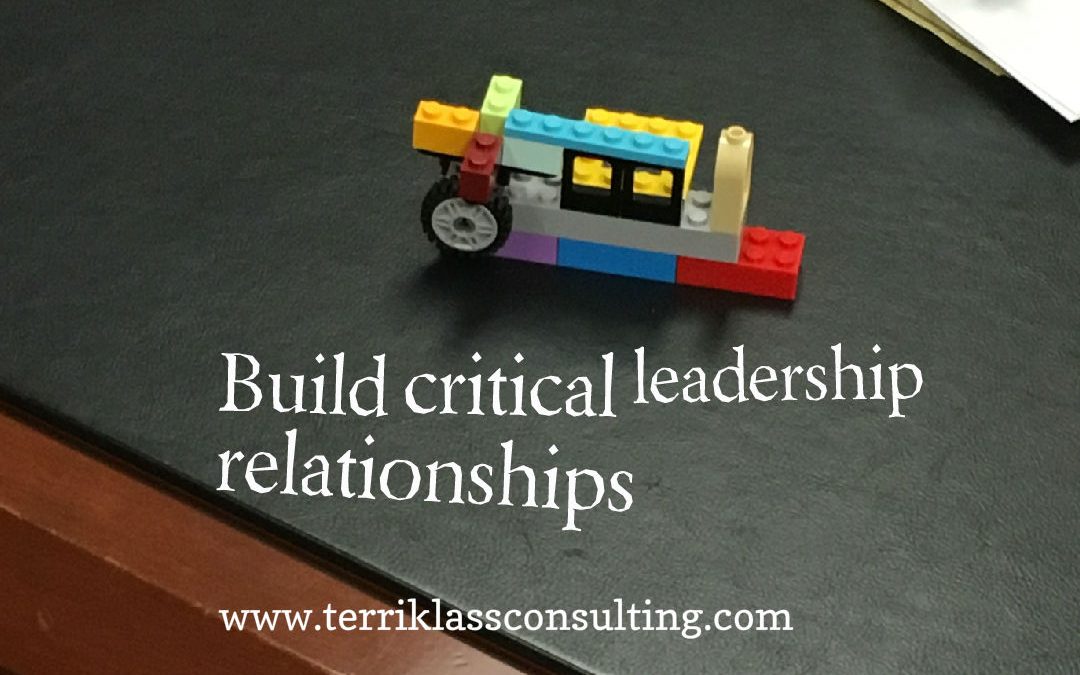When things go wrong in our professional lives it usually ends up revolving around a missed target, confusing message or personality clash. All of these unmet expectations point in the exact same direction- a collision with a workplace or customer relationship. The truth is that we all miss deadlines, make mistakes, hear a communication incorrectly and have conflict with others. That’s just human nature and the reality of working. The thing is if we have strong relationships with people in the workplace we can face our challenges constructively and rebound with greater precision and more successful outcomes. But the key is to build deep connections so when we do fall on our faces, we can rely on our support system.
[Tweet “Building trusting relationships is key to our leadership success.”]
Here are five critical leadership relationships:
1. COLLEAGUES
There is nothing better than camaraderie and feeling like you belong to the club. When we forge meaningful relationships with our team members we stand by one another and support each other in times of professional and personal crises. So when mistakes are made we step up and help a co-worker by rolling up our sleeves. Since we spend so many hours a day with our teammates, they often become our friends.
2. BOSS
Our relationship with our bosses at all levels is important to us growing and performing well. Some bosses are definitely better than others but we have some control in working alongside of them. Some of our bosses will end up being the most impactful mentors in our careers.
- Ask for honest feedback and be open to it
- Listen for their wisdom
- Model the skills and strategies that may help us grow our leadership
- Never accept any abuse
3. DIRECT REPORTS
Some of us are individual contributors while others have people who we manage. If we do have direct reports we need to lead with generosity and care. Managing others is a privilege and cultivating a trusting relationship is top priority with our direct reports.
- Our success as a leader depends on how well we can develop future leaders
- Be an approachable leader who is open to different perspectives
- Offer helpful feedback with respect and specifics
- Be willing to learn new things from your team
[Tweet “To build team member relationships, offer feedback with respect.”]
4. CUSTOMERS
Our customer relationships are so valuable to each of us. We need to communicate with them with understanding and respect. We also can learn so much from them. For me, I have gained an incredible amount of knowledge from each of my clients. They are so wise and by listening strategically, I am able to see their challenges from their perspectives. That’s key. Of course we each want to solve our customer’s issues as efficiently and effectively as possible, but to do that we need to develop a high level of trust with them. Following through by doing what we say we will do builds our trustworthiness and credibility.
5. DIFFERENT DEPARTMENTS
Whether we work in large organizations or in smaller collaborations, developing relationships with people on other teams can really impact the outcome of our projects.
- Be open to different department needs
- Partner on joint goals
- Be understanding if deadlines need to be adjusted
- Offer your help to enrich a solution
What other leadership relationships are critical to you?



I love your list, Terri! So often we leave “boss” out of it but we really do need to cultivate relationships with those above us as well as those around and below us. As you point out, this is where we find some of our best opportunities to be mentored by those we trust and want to emulate…
We all have good bosses and bad bosses but with each, if we stay open we can learn so much about our leadership. With one of my more difficult bosses who didn’t spend a great deal of time with his direct reports, I learned the importance of being approachable.
Thanks LaRae for continuing the dialogue and adding your wonderful insights!
They ARE our colleagues but so often put into another category- and that’s part of the problem. Support staff are more than background people who we engage when needed. They may not be on the front line but certainly impact our client service. When we forget that support staff are part of the engine and not some other part off to the side, conflicts arise.
Great advice, Terri. Will share!
Alli
Support staff are important to all of our teams and organizations. We need to honor our support staff relationships by making sure we listen to them and treat them with respect. Every relationship is critical to helping us be the best leaders we can be.
Thanks Alli!
Great post Terri! It is fun to look back at previous volunteers, employees, employers, peers and customers that are a part of my life today – many as dear friends.
It is so fulfilling when our professional relationships turn into deeper connections and even dear friends. We certainly experienced that with our work on our book. We all need to build a trusted team of advisers from all parts of our lives to help us grow into strong leaders.
Thanks Chery!